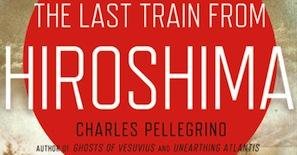Charles Pellegrino's The Last Train from Hiroshima was published in January to widespread acclaim for its account of the city's experiences during and after the 1945 atomic bomb explosion.
One of Pellegrino's best sources for the book was be Joseph Fuoco, who supposedly flew as flight engineer on one of the observation planes that accompanied Enola Gay on its bombing mission. Except that the family of the flight's actual engineer James Corliss (who died in 1999) had detailed records that could prove that Fuoco was never on the flight. Fortunately for the author, Fuoco had died in 2008 and Pellegrino could blame the whole mess on the World War II veteran, telling the New York Times, "I'm stunned. I liked and admired the guy. He had loads and loads of papers, and photographs of everything."
OK, problem solved, right? Even the best historian can get burned by a source. Pellegrino promised to correct the errors for the paperback edition and his movie deal with Avatar director James Cameron remained intact.
Not really. Some readers were so upset that they started digging into Pellegrino's other stories. After the writer couldn't produce evidence that two of his on-the-ground witnesses in Hiroshima ever existed, his publisher decided to withdraw Last Train from Hiroshima from further production and blamed the whole mess on Pellegrino:
"The author of any work of nonfiction must stand behind its content. We must rely on our authors to answer questions that may arise as to the accuracy of their work and reliability of their sources. Unfortunately, Mr. Pellegrino was not able to answer the additional questions that have arisen about his book to our satisfaction."
Not content to let the humiliation stop there, AP writer Hillel Italie decided to do a background check on Pellegrino and discovered that the author also made up his claimed 1982 Ph.D. from Victoria University of Wellington, New Zealand.
So, you ask yourself: how does this happen? The dirtiest secret of the nonfiction book world is the publishers' willingness to trust authors to fact-check their own work. Research is expensive, so why no rely on some imaginary author's or historian's code of ethics to keep your writers honest?
Before we had the Internet, only a big fat liar like Clifford Irving and his entirely made-up '70s autobiography of Howard Hughes really risked getting caught. Most newspapers would have dismissed James Corliss' family as cranks when they claimed that Pellegrino's Fuoco stories were wrong, likely choosing to side with a major publisher by default.
Ever since narrative nonfiction books became big business in the '60s, there's been enormous pressure on authors to come up with a compelling new angle on their subject, something that would get them invited to talk on Dick Cavett or Larry King or Charlie Rose.
If Google ever gets around to scanning all those past best-sellers and putting them up online, there will be an endless parade of sloppy factual errors exposed and more than a few entirely made-up stories or characters discovered in some of our favorite "true" stories.
Charles Pellegrino should hope he lives long enough to see that day.




